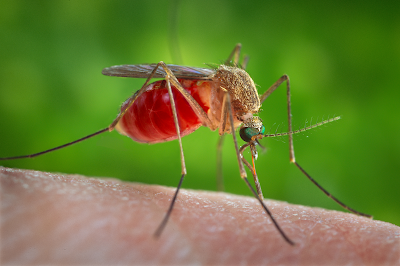"In Georgia, West Nile virus is primarily spread by the southern house mosquito Culex quinquefasciatus," says Gonzalo Vazquez-Prokopec, associate professor in Emory's Department of Environmental Sciences. (CDC/James Gathany)
August to September is the peak of the West Nile virus (WNV) season and Atlanta area health officials have reported finding mosquitoes testing positive for the pathogen, including from 11 locations across DeKalb County. No human cases, however, have been reported.
WNV is most commonly spread to people by the bite of an infected mosquito. Most people who become infected do not feel sick, but about one in five develop a fever and other symptoms. And about one out of 150 people infected develop a serious, sometimes fatal, illness, according to the CDC.
Gonzalo Vazquez-Prokopec, associate professor in Emory University's
Department of Environmental Sciences, is an expert in mosquito-borne
diseases. His lab has studied the urban ecology of metro Atlanta and the
Culex mosquito — a vector for WNV and other human pathogens.
Vazquez-Prokopec is currently in the field in Brazil, but we caught up with him via email for a brief Q and A.
What should people know about the particular type of mosquito that spreads WNV?
In Georgia, West Nile virus is primarily spread by the southern house mosquito Culex quinquefasciatus. This light-brown colored species bites at dusk and dawn, and is found in high numbers in and around houses and in open areas, such as parks.
Is it normal to detect WNV in so many Atlanta-area mosquitoes this time of year?
Yes,
the infection rates in mosquitoes, gathered from
different mosquito traps, are following trends that we’ve seen in
previous years. What we do not see is human cases — so far this year
none have been reported for Georgia.
Is Atlanta normally at higher or average risk for human cases of WNV?
Human infection with WNV is low in Georgia compared to some states in the Northeast or Midwest. This is remarkably different from what we see in mosquitoes and birds which, in Atlanta, have equally high WNV levels compared to the Northeast and Midwest. What seems to be different is the rate of spillover of the virus, or transfer from the wildlife cycle to humans, which definitely appears to be suppressed in the Southeastern United States.
How can people best protect themselves?
Reducing human exposure to Culex mosquitoes is key to maintaining the low rates of human infection. It’s best to follow the recommendations on the CDC web site to use insect repellent and wear long-sleeved shirts and long pants when outside to protect yourself from mosquito bites, and to remove any standing water around your home. Dekalb County has a great checklist on its web site to help locate potential mosquito breeding sites around your yard.
Related:
Cardinals may reduce West Nile virus spillover in Atlanta
Sewage raises West Nile virus risk


No comments:
Post a Comment